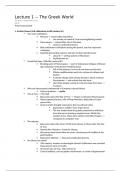Lecture notes
European Cultural History
- Module
- Institution
This document provides lectures notes about: 1) Lecture 1: The Greek World 2) Lecture 2: Rome and its Empire 3) Lecture 3: Early and high Middle Ages 4) Lecture 4: The high and late Middle Ages 5) Lecture 5: Renaissance 6) Lecture 6: The reformation and counter reformation 7) Lectur...
[Show more]



